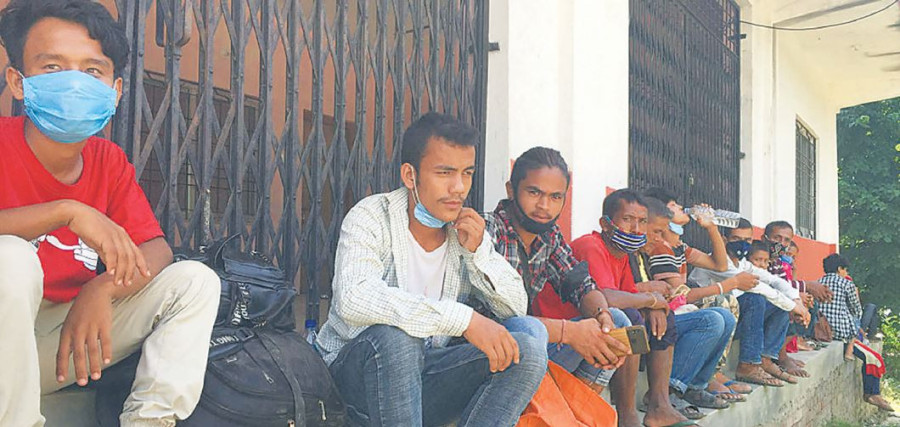Editorial
The burden of unemployment
We cannot afford off-and-on lockdowns and prohibitory orders that jeopardise the economy.
A recent Nepal Rastra Bank survey which looked into the effects of Covid-19 on Nepal’s economy showed that tens of thousands of people were rendered jobless during the four-month-long lockdown while there was a massive disruption in the production and supply chain as 61 percent of businesses shut their operations completely. The survey, which covered 52 districts involving 674 industries, business ventures and start-ups, reported that small and medium scale enterprises and early-stage start-ups were among the worst hit while 77.2 percent of the businesses did not have the cash flow to pay employee salaries besides other fixed expenditures.
The survey also showed that 22.5 percent of employees were laid off by businesses, including in the manufacturing and service sectors, two-thirds of whom were under contract basis or were hired on a temporary basis. The largest layoffs were in the hotel and restaurant sector, followed by small and medium scale enterprises which laid off 30.5 percent of their employees. The survey also reports that on average, industries and businesses trimmed 18.2 percent of their payroll. However, the average pay cut by big businesses was 22.5 percent against a 13.6 percent cut by medium businesses.
For an already bleak reality, re-imposed lockdown and prohibitory orders amid the deteriorating Covid-19 situation in the country is only increasing our challenges which, if not dealt with urgently, could embroil the country in socio-economic and political issues. There is little foresight on how and when the current situation will evolve to our advantage, and youths, especially in rural Nepal, have started to leave for India in search of jobs. This has raised a big question on the employment schemes that have been rolled out by the government to absorb the labour force at home, especially when the country expects more returnees from migrant destination countries given the pandemic.
While the challenges keep getting bigger, the symptoms, however, are not new. Unemployment remains one of the biggest problems in Nepal, which has forced hundreds of thousands of Nepali youths in the past decades to migrate in search of livelihood opportunities, often in dangerous and slave-like conditions. While none of the political leadership to this day has been able to commit to its promises to create jobs, the Oli administration’s Prime Minister Employment Programme has also failed to create jobs and meet its targets, two years since its inception.
This fiscal year, as part of the programme, the government aimed to create a minimum of 100 days of wage employment jobs for some 200,000 people, but there are no jobs at the local level. Even the outgoing finance minister Yuba Raj Khatiwada repeatedly said that the domestic workforce could replace foreign workers involved in various sectors, but the much touted employment programme, which has instead drawn criticism for taking loans for its implementation, has failed and the budget allocated for the programme remains unspent.
Earlier this year, the government had doubled the programme’s budget to Rs11.6 billion and in July, the Labour Ministry had also received a soft loan of approximately Rs14 billion from the World Bank to implement the five-year Youth Employment Transformation Initiative under the programme, but it has not shown any credible results while nothing has changed for Nepalis who continue to migrate to India or are seeking labour permits or seats on the next flight out.
Desperate times call for desperate measures. We cannot afford off-and-on lockdowns and prohibitory orders which directly affect the economy, and as a result, employment opportunities. Reopening the economy, given the public health crisis of this scale, depends on how swiftly we expand testing and contact tracing to break the chain of transmission of the virus. The government must rise to this challenge and launch a massive testing programme, together with antibody testing. It must also launch a nationwide behavioural change campaign to instil precautionary measures against the coronavirus. This is the only way to reopen the economy and create jobs and safeguard them.
***
What do you think?
Dear reader, we’d like to hear from you. We regularly publish letters to the editor on contemporary issues or direct responses to something the Post has recently published. Please send your letters to [email protected] with "Letter to the Editor" in the subject line. Please include your name, location, and a contact address so one of our editors can reach out to you.




 14.24°C Kathmandu
14.24°C Kathmandu














